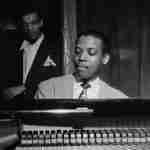Learning improvisation can be a curious process. Every now and then as we endeavor to educate ourselves musically, we hear bits of advice and pick up words of wisdom from master classes, videos, books, and conversations. Yet, we don’t really listen to these directions or take them to heart. The truth is that we can’t accept these words of wisdom. Well, at least not until we discover their validity for ourselves. We need to be hit in the gut emotionally and we need to see the light with our own two eyes.
This is the funny thing about human nature. People can tell you repeatedly how to do things, whether it’s how to eat right, how to exercise, or how to play jazz, until they are blue in the face. But, until you change your diet, hit the gym, and start transcribing solos, experiencing these tangible results for yourself, this information has no impact on you.
You have to have that light bulb moment where you realize “Oh yeah, this stuff actually does work…” You need to realize that you’re not some exception to the rules that everyone else is following, these words apply to you and they can help you. You simply need to listen.
For me, this moment came after I moved to New York. All of a sudden I was in a musical environment where the level was extremely high. From seeing my heroes play nightly in clubs to seeing unknown players tearing it up at jam sessions, there was no question about what was expected in learning the jazz language and pursuing the art of improvisation.
Everything that I had ignored like learning from the records and transcribing language became painfully obvious in a matter of seconds.
If you perk up your senses and take look around, you’ll start to see this information everywhere; a short interview with your favorite player, an inconspicuous quote in a book, or a quick chat with a great player. Listening to the advice of great improvisers can drastically change your playing.
Here’s one such video containing some of these aforementioned insights. On this clip done by JazzTimes, the trumpeter Avishai Cohen casually describes his musical education and makes three very important points about the struggle to learn improvisation. But, like any words of wisdom, they can go by unnoticed all too easily:
I) Learn from the records
The history of the music is captured on the records. It could be a record from 80 years ago or an album released yesterday that you just downloaded. The answers are all there – you just have to search for them. Along with live concerts and dedicated musicians, this is where the essence of the music resides.
A record is something that you can actually take into the practice room with you and interact with. The information is right there and there is no question as to what is going on. As Mulgrew Miller often said, “It’s all there on the records.”
Looking to books or instructional videos for the secret of improvisation is like getting a diluted version from a second hand source. If someone is in a room speaking directly to you, you don’t ask the person standing next to you to repeat what the speaker said or beg for their personal interpretation, you go straight to the source. So when it comes to music, go straight to the source!
This seems incredibly obvious, however most people continue to look for answers in every direction except the records themselves. The language will not just magically jump into your fingers after you’ve put on a record however, you need to work hard to get it. As Avishai says in the clip above, you need to become obsessed with these records and listen to them hundreds of times.
II) Transcribe the language
Jazz is a language and you learn this language from the records and the great players that you come into contact with. There’s a reason that all great improvisers, from Mulgrew to Avishai Cohen in the clip above, refer to jazz as a language.
It’s an art form that you must to learn to speak. You need to learn the vocabulary, the accents, the idioms, and the subtleties of conversation. If you approximate it or just learn it half way, people aren’t going to understand you and they’ll look at you weirdly as they would an ignorant outsider.
More than a language, it’s a tradition, a rite of passage. If you want to get from where you are today to the level of your heroes, you are going to have to do some very specific things. There are rules and requirements in this process, but they aren’t the ones that you find in schools and the theory books.
You must spend hours listening to the great recordings, over and over again. You must learn the language off of the records, transcribing solos, melodies, and chord progressions. Develop your ears as well as your mind. You need to play with other musicians and lean how to interact within a group. You need to try and fail, and then try even harder to get to the level you aspire for.
III) It’s obvious if you don’t speak the language
Have you ever been in a situation where you know you’re faking it? You’re playing the part, you bought the clothes, you talk the talk, and you go through the motions, but, you don’t really belong because you haven’t done the work. It’s a well intentioned act, but it’s not real at the core of your being. This is what it’s like trying to improvise without studying the records and transcribing the language. Believe me, I’ve been there.
You know your theory, you know the melody of the tune, and you’ve memorized the chord progression, but when you improvise, something is off. Things are just not adding up correctly. You know it, the other musicians know it, and the audience can unconsciously hear that something is not right.
If this sounds familiar, stop going down this path of trying to use theory to improvise. You can try for years to turn that theory into creative, musical lines, but despite all of this work, you still won’t be speaking the language.
The words in the video above are like many that you’ve heard in the past and will continue to hear for many years to come. In seconds they can pass you by unnoticed, seemingly unimportant. However, the answer is sitting right there anytime a great player says, “This is how I did it…”
It seems too simple to be true, but guess what? It is that simple. Finding the method of improvement is the easy part and when you know where to look, it’s everywhere. The hard part is something that we can all work on – we just have to listen.










